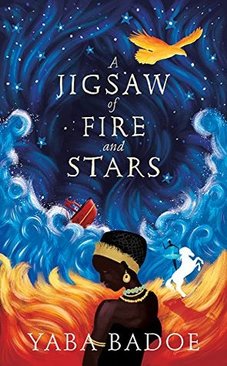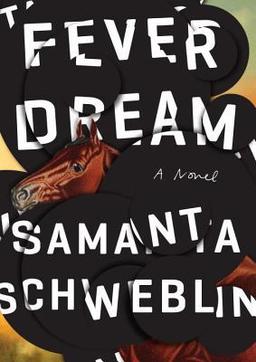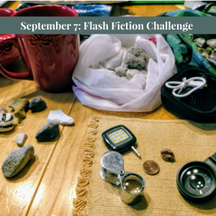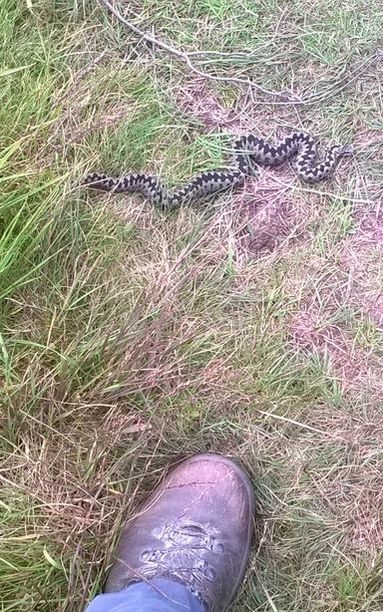A Jigsaw of Fire and Stars by Yaba Badoe
Fourteen years on she's a member of Mama Rose's unique and dazzling circus. But, from their watery grave, the unquiet dead are calling Sante to avenge them:
A bamboo flute. A golden bangle. A ripening mango which must not fall... if Sante is to tell their story and her own.
Rich in the rhythms and colours of Africa and glittering circus days. Unflinching in its dark revelations about life. Yaba Badoe's novel is beautiful and cruel and will linger long in the memory.
Not having read anything for that age group since I was a teenager myself (apart from a single chapter of a Harry Potter which, although better than I expected, didn’t entice me to read any more), I can’t tell you how it compares with other novels for children. I can tell you that I heartily enjoyed it and would happily read whatever Yaba Badoe writes next.
The lively pace and language had me turning the pages and, if the teenage protagonist occasionally got out of scrapes as easily as they slipped into them, I didn’t mind. How could I not enjoy a novel about the importance of adolescence in forging our identities when I’d written one myself? Even so, I’m not generally drawn to novels about childhood, even when they’re targeted at adults.
A Jigsaw of Fire and Stars is a life-affirming magic-realism adventure story against a backdrop of Ghanaian culture, tackling serious issues of migration and forced prostitution in a realistic yet sensitive manner, neither sugar-coating the issues nor zooming in excessively on the horrors. An impressive achievement: it’s not only younger readers who appreciate being protected without being patronised.
Fever Dream by Samanta Schweblin translated by Megan McDowell
While her husband is working in the city, Amanda has rented a rural holiday home for herself and young daughter, Nina. She’s barely unpacked when she meets Carla, who tells her a shocking story about her son, David, being brought back from the brink of death by a shamanistic procedure involving the transmigration of souls. Witnessing Carla’s coldness towards her son, Amanda doubts her sanity. But she soon finds that, even as a visitor and as a mother ever conscious of the “rescue distance” between herself and her child, she can’t escape the poison leaching out across the entire town.
Structured as a dialogue between Amanda, feverish in a hospital bed, and David, prompting her to record every detail of the terrible events that brought her there, I could imagine Fever Dream as a spooky TV film. In contrast to the feverish Guardian review that brought it to my attention, I found this novel enjoyable but slight, both in its conception and length (I read the 150 small pages in the time it would have taken to watch the film, if it existed) and the structure, although unusual, a bit gimmicky.
Longlisted for the Man Booker International Prize, Megan McDowell’s translation is published by Oneworld who provided my review copy. Since I missed it last month, this fable of maternal anxiety and the degradation of the countryside wrought by agrochemicals stands as my belated contribution to Women in Translation month (although I did manage to review four relevant novels last year).
| Remember the snakes I mentioned in the introduction? If the spirits were watching out for me, that would have been the subject of this week’s flash fiction challenge. I wanted to show off my photo of the adder I met on the moors a couple weeks ago, but I can’t contribute a story about a slippery creature to a collection about busy characters. I’ll have to hang back for my post on September resolutions. If I’m not too busy to pull it together before Tuesday’s deadline. |
| No time to stand and stare? A shorter walk today, and no dawdling. Busy busy, lots to do back home. The squiggle on the path broke her rhythm. Even here, in its natural habitat, an adder was a rare sight. She’d disturbed one once, only a mile away, but it slithered into the bracken before she could distinguish the diamonds on its back. This one seemed to be posing. How close could she get before it reared its head and spat? A gift. A blessing. She’d stay as long as the snake did. A poor life, if she lacked the leisure to stand and stare. |

























 RSS Feed
RSS Feed





















